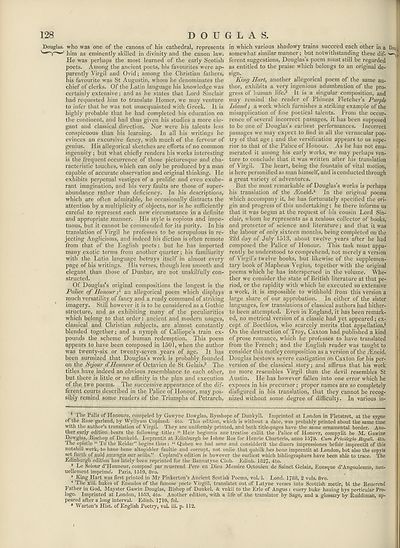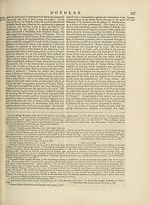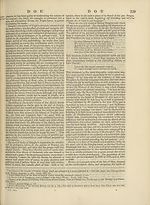Encyclopaedia Britannica > Volume 8, DIA-England
(138) Page 128
Download files
Complete book:
Individual page:
Thumbnail gallery: Grid view | List view

r
DOUGLAS.
128
Douglas, who was one of the canons of his cathedral, represents
'whim as eminently skilled in divinity and the canon law.
He was perhaps the most learned of the early Scotish
poets. Among the ancient poets, his favourites were ap¬
parently Virgil and Ovid; among the Christian fathers,
his favourite was St Augustin, whom he denominates the
chief of clerks. Of the Latin language his knowledge was
certainly extensive; and as he states that Lord Sinclair
had requested him to translate Homer, we may venture
to infer that he was not unacquainted with Greek. It is
highly probable that he had completed his education on
the continent, and had thus given his studies a more ele¬
gant and classical direction. Nor were his talents less
conspicuous than his learning. In all his writings he
evinces an excursive fancy, with much of the fervour of
genius. His allegorical sketches are efforts of no common
ingenuity ; but what chiefly renders his works interesting
is the frequent occurrence of those picturesque and cha¬
racteristic touches, which can only be produced by a man
capable of accurate observation and original thinking. He
exhibits perpetual vestiges of a prolific and even exube¬
rant imagination, and his very faults are those of super¬
abundance rather than deficiency. In his descriptions,
which are often admirable, he occasionally distracts the
attention by a multiplicity of objects, nor is he sufficiently
careful to represent each new circumstance in a definite
and appropriate manner. His style is copious and impe¬
tuous, but it cannot be commended for its purity. In his
translation of Virgil he professes to be scrupulous in re¬
jecting Anglicisms, and indeed his diction is often remote
from that of the English poets: but he has imported
many exotic terms from another quarter; his familiarity
with the Latin language betrays itself in almost every
page of his writings. His verses, though less smooth and
elegant than those of Dunbar, are not unskilfully con¬
structed.
Of Douglas's original compositions the longest is the
Police of Honour ;x an allegorical poem which displays
much versatility of fancy and a ready command of striking
imagery. Still however it is to be considered as a Gothic
structure, and as exhibiting many of the peculiarities
which belong to that order: ancient and modern usages,
classical and Christian subjects, are almost constantly
blended together; and a nymph of Calliope’s train ex¬
pounds the scheme of human redemption. This poem
appears to have been composed in 1501, when the author
was twenty-six or twenty-seven years of age. It has
been surmized that Douglas’s work is probably founded
on the Sejour d'Honneur of Octavien de St Gelais.1 2 The
titles have indeed an obvious resemblance to each other,
but there is little or no affinity in the plan and execution
of the two poems. The successive appearance of the dif¬
ferent courts described in the Palice of Honour, may pos¬
sibly remind some readers of the Triumphs of Petrarch,
in which various shadowy trains succeed each other in a Dou
somewhat similar manner; but notwithstanding these dif-y,
ferent suggestions, Douglas’s poem must still be regarded
as entitled to the praise which belongs to an original de-
sign.
King Hart, another allegorical poem of the same au¬
thor, exhibits a very ingenious adumbration of the pro¬
gress of human life.3 It is a singular composition, and
may remind the reader of Phineas Fletcher’s Purple
Island; a work which furnishes a striking example of the
misapplication of fine poetical talents. From the occur¬
rence of several incorrect passages, it has been supposed
to be one of Douglas’s earliest performances. Incorrect
passages we may expect to find in all the vernacular poe¬
try of that age; and the versification appears to us supe¬
rior to that of the Palice of Honour. As he has not enu¬
merated it among his early works, we may perhaps ven¬
ture to conclude that it was written after his translation
of Virgil. The heart, being the fountain of vital motion,
is here personified as man himself, and is conducted through
a great variety of adventures.
But the most remarkable of Douglas’s works is perhaps
his translation of the iEneid.4 In the original poems
which accompany it, he has fortunately specified the ori¬
gin and progress of this undertaking: he there informs us
that it was begun at the request of his cousin Lord Sin¬
clair, whom he represents as a zealous collector of books,
and protector of science and literature; and that it was
the labour of only sixteen months, being completed on the
22d day of July 1513, about twelve years after he had
composed the Palice of Honour. This task must appa¬
rently be understood to comprehend, not merely a version
of Virgil’s twelve books, but likewise of the supplemen¬
tary book of Mapheus Vegius, together with the original
poems which he has interspersed in the volume. Whe¬
ther we consider the state of British literature at that pe¬
riod, or the rapidity with which he executed so extensive
a work, it is impossible to withhold from this version a
large share of our approbation. In either of the sister
languages, few translations of classical authors had hither¬
to been attempted. Even in England, it has been remark¬
ed, no metrical version of a classic had yet appeared; ex¬
cept of Boethius, who scarcely merits that appellation.5
On the destruction of Troy, Caxton had published a kind
of prose romance, which he professes to have translated
from the French; and the English reader was taught to
consider this motley composition as a version of the JEneid.
Douglas bestows severe castigation on Caxton for his per¬
version of the classical story; and affirms that his work
no more resembles Virgil than the devil resembles St
Austin. He has however fallen into one error which he
exposes in his precursor; proper names are so completely
disfigured in his translation, that they cannot be recog¬
nized without some degree of difficulty. In various in-
1 The Palis of Honoure, compeled by Gawyne Dowglas, Bysshope of Dunkyll. Imprinted at London in Fletstret, at the sygne
of the Rose garland, by Wyllyam Copland. 4to. This edition, which is without a date, was probably printed about the same time
with the author’s translation of Virgil. They are uniformly printed, and both title-pages have the same ornamental border. Ano¬
ther early edition bears the following title: “ Heir beginnis ane treatise callit the Palice of Honovr, compylit be M. Gawine
Dowglas, Bischop of Dunkeld. Imprentit at Edinburgh be lohne Bos for Henrie Charteris, anno 1579. Cum Privilcgio Regali. 4to.
The epistle “ To the lleidar” begins thus : “ Quhen we had sene and considderit the diuers impressiones befoir imprentit of this
notabill werk, to haue bene altogidder faultie and corrupt, not onlie that quhilk lies bene imprentit at London, bot also the copyis
set furth of auld amangis our selfis.” Copland’s edition is however the earliest which bibliographers have been able to trace. The
Edinburgh edition has lately been reprinted for the Bannatyne Club. Edinb. 1827, 4to.
2 Le Seiour d’Honneur, compose par reuerend Pere en Dieu Messire Octouien de Sainct Gelaiz, Euesque d’Angoulesme, nou-
uellement imprimd, Paris, 1519, 8vo. ,
3 King Hart was first printed in Mr Pinkerton’s Ancient Scotish Poems, vol. i. Lond. 1788, 2 vols. 8vo.
4 The xiii. bukes of Eneados of the famose poete Virgill, translatet out of Latyne verses into Scottish metir, hi the Eeuerend
Father in God, Mayster Gawin Douglas, Bishop of Dunkel, & vnkil to the Erie of Angus : euery buke hauing hvs perticular Pro-
loge. Imprinted at London, 1553, 4to. Another edition, with a life of the translator by Sage, and a glossary by lluddiman, ap¬
peared after a long interval. Edinb. 171G, fol.
* Warton’s Hist, of English Poetry, vol. iii. p. 112.
DOUGLAS.
128
Douglas, who was one of the canons of his cathedral, represents
'whim as eminently skilled in divinity and the canon law.
He was perhaps the most learned of the early Scotish
poets. Among the ancient poets, his favourites were ap¬
parently Virgil and Ovid; among the Christian fathers,
his favourite was St Augustin, whom he denominates the
chief of clerks. Of the Latin language his knowledge was
certainly extensive; and as he states that Lord Sinclair
had requested him to translate Homer, we may venture
to infer that he was not unacquainted with Greek. It is
highly probable that he had completed his education on
the continent, and had thus given his studies a more ele¬
gant and classical direction. Nor were his talents less
conspicuous than his learning. In all his writings he
evinces an excursive fancy, with much of the fervour of
genius. His allegorical sketches are efforts of no common
ingenuity ; but what chiefly renders his works interesting
is the frequent occurrence of those picturesque and cha¬
racteristic touches, which can only be produced by a man
capable of accurate observation and original thinking. He
exhibits perpetual vestiges of a prolific and even exube¬
rant imagination, and his very faults are those of super¬
abundance rather than deficiency. In his descriptions,
which are often admirable, he occasionally distracts the
attention by a multiplicity of objects, nor is he sufficiently
careful to represent each new circumstance in a definite
and appropriate manner. His style is copious and impe¬
tuous, but it cannot be commended for its purity. In his
translation of Virgil he professes to be scrupulous in re¬
jecting Anglicisms, and indeed his diction is often remote
from that of the English poets: but he has imported
many exotic terms from another quarter; his familiarity
with the Latin language betrays itself in almost every
page of his writings. His verses, though less smooth and
elegant than those of Dunbar, are not unskilfully con¬
structed.
Of Douglas's original compositions the longest is the
Police of Honour ;x an allegorical poem which displays
much versatility of fancy and a ready command of striking
imagery. Still however it is to be considered as a Gothic
structure, and as exhibiting many of the peculiarities
which belong to that order: ancient and modern usages,
classical and Christian subjects, are almost constantly
blended together; and a nymph of Calliope’s train ex¬
pounds the scheme of human redemption. This poem
appears to have been composed in 1501, when the author
was twenty-six or twenty-seven years of age. It has
been surmized that Douglas’s work is probably founded
on the Sejour d'Honneur of Octavien de St Gelais.1 2 The
titles have indeed an obvious resemblance to each other,
but there is little or no affinity in the plan and execution
of the two poems. The successive appearance of the dif¬
ferent courts described in the Palice of Honour, may pos¬
sibly remind some readers of the Triumphs of Petrarch,
in which various shadowy trains succeed each other in a Dou
somewhat similar manner; but notwithstanding these dif-y,
ferent suggestions, Douglas’s poem must still be regarded
as entitled to the praise which belongs to an original de-
sign.
King Hart, another allegorical poem of the same au¬
thor, exhibits a very ingenious adumbration of the pro¬
gress of human life.3 It is a singular composition, and
may remind the reader of Phineas Fletcher’s Purple
Island; a work which furnishes a striking example of the
misapplication of fine poetical talents. From the occur¬
rence of several incorrect passages, it has been supposed
to be one of Douglas’s earliest performances. Incorrect
passages we may expect to find in all the vernacular poe¬
try of that age; and the versification appears to us supe¬
rior to that of the Palice of Honour. As he has not enu¬
merated it among his early works, we may perhaps ven¬
ture to conclude that it was written after his translation
of Virgil. The heart, being the fountain of vital motion,
is here personified as man himself, and is conducted through
a great variety of adventures.
But the most remarkable of Douglas’s works is perhaps
his translation of the iEneid.4 In the original poems
which accompany it, he has fortunately specified the ori¬
gin and progress of this undertaking: he there informs us
that it was begun at the request of his cousin Lord Sin¬
clair, whom he represents as a zealous collector of books,
and protector of science and literature; and that it was
the labour of only sixteen months, being completed on the
22d day of July 1513, about twelve years after he had
composed the Palice of Honour. This task must appa¬
rently be understood to comprehend, not merely a version
of Virgil’s twelve books, but likewise of the supplemen¬
tary book of Mapheus Vegius, together with the original
poems which he has interspersed in the volume. Whe¬
ther we consider the state of British literature at that pe¬
riod, or the rapidity with which he executed so extensive
a work, it is impossible to withhold from this version a
large share of our approbation. In either of the sister
languages, few translations of classical authors had hither¬
to been attempted. Even in England, it has been remark¬
ed, no metrical version of a classic had yet appeared; ex¬
cept of Boethius, who scarcely merits that appellation.5
On the destruction of Troy, Caxton had published a kind
of prose romance, which he professes to have translated
from the French; and the English reader was taught to
consider this motley composition as a version of the JEneid.
Douglas bestows severe castigation on Caxton for his per¬
version of the classical story; and affirms that his work
no more resembles Virgil than the devil resembles St
Austin. He has however fallen into one error which he
exposes in his precursor; proper names are so completely
disfigured in his translation, that they cannot be recog¬
nized without some degree of difficulty. In various in-
1 The Palis of Honoure, compeled by Gawyne Dowglas, Bysshope of Dunkyll. Imprinted at London in Fletstret, at the sygne
of the Rose garland, by Wyllyam Copland. 4to. This edition, which is without a date, was probably printed about the same time
with the author’s translation of Virgil. They are uniformly printed, and both title-pages have the same ornamental border. Ano¬
ther early edition bears the following title: “ Heir beginnis ane treatise callit the Palice of Honovr, compylit be M. Gawine
Dowglas, Bischop of Dunkeld. Imprentit at Edinburgh be lohne Bos for Henrie Charteris, anno 1579. Cum Privilcgio Regali. 4to.
The epistle “ To the lleidar” begins thus : “ Quhen we had sene and considderit the diuers impressiones befoir imprentit of this
notabill werk, to haue bene altogidder faultie and corrupt, not onlie that quhilk lies bene imprentit at London, bot also the copyis
set furth of auld amangis our selfis.” Copland’s edition is however the earliest which bibliographers have been able to trace. The
Edinburgh edition has lately been reprinted for the Bannatyne Club. Edinb. 1827, 4to.
2 Le Seiour d’Honneur, compose par reuerend Pere en Dieu Messire Octouien de Sainct Gelaiz, Euesque d’Angoulesme, nou-
uellement imprimd, Paris, 1519, 8vo. ,
3 King Hart was first printed in Mr Pinkerton’s Ancient Scotish Poems, vol. i. Lond. 1788, 2 vols. 8vo.
4 The xiii. bukes of Eneados of the famose poete Virgill, translatet out of Latyne verses into Scottish metir, hi the Eeuerend
Father in God, Mayster Gawin Douglas, Bishop of Dunkel, & vnkil to the Erie of Angus : euery buke hauing hvs perticular Pro-
loge. Imprinted at London, 1553, 4to. Another edition, with a life of the translator by Sage, and a glossary by lluddiman, ap¬
peared after a long interval. Edinb. 171G, fol.
* Warton’s Hist, of English Poetry, vol. iii. p. 112.
Set display mode to:
![]() Universal Viewer |
Universal Viewer | ![]() Mirador |
Large image | Transcription
Mirador |
Large image | Transcription
Images and transcriptions on this page, including medium image downloads, may be used under the Creative Commons Attribution 4.0 International Licence unless otherwise stated. ![]()
| Encyclopaedia Britannica > Encyclopaedia Britannica > Volume 8, DIA-England > (138) Page 128 |
|---|
| Permanent URL | https://digital.nls.uk/193324799 |
|---|
| Attribution and copyright: |
|
|---|
| Description | Ten editions of 'Encyclopaedia Britannica', issued from 1768-1903, in 231 volumes. Originally issued in 100 weekly parts (3 volumes) between 1768 and 1771 by publishers: Colin Macfarquhar and Andrew Bell (Edinburgh); editor: William Smellie: engraver: Andrew Bell. Expanded editions in the 19th century featured more volumes and contributions from leading experts in their fields. Managed and published in Edinburgh up to the 9th edition (25 volumes, from 1875-1889); the 10th edition (1902-1903) re-issued the 9th edition, with 11 supplementary volumes. |
|---|---|
| Additional NLS resources: |
|

